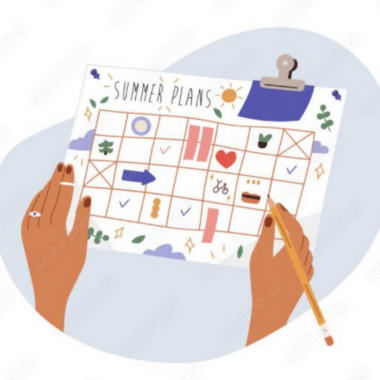Managing Your Time and Finding Balance
Written by: Cordelia Kraus, Pre-Health Peer Advisor
It’s no secret that students on a pre-health track are busy. Between exams, homework,
research, volunteering, and other extracurriculars, there are a plethora of things
you’re supposed to be doing.

That being said, you’ll definitely have to learn how to manage your time well! Time management is a skill that transcends just being on a pre-health track. It’s something that will benefit you your entire life!
Sounds great in theory, right? But how does someone actually manage their time…

Let’s get into it!
1. Get organized. Schedule! Schedule! Schedule!

Yes, you heard me right. It’s time to whip out that dusty planner your mom got you when you were twelve. That whiteboard, perchance? Outlook Calendar, maybe? Your Notes app?
WHAT you decide to use is trivial, what IS important is that you have some way to keep track of all of your obligations. This can look as precise as blocking out your time down to the hour, to as loose as recording when your grandma’s birthday is (because c’mon, who really keeps a mental note of that?) Either way, important assignments, deadlines, activities, extracurriculars, etc. should be on your schedule.
2. Create a routine.
I know. I know. Many people share the ideology that routines are rigid, stifling, and in many cases, perhaps, boring. But putting just an inkling of structure in your day can help you be more productive, reach your goals, and even reduce your stress and anxiety.
For me, personally, implementing some structure gives me a sense of control and keeps me grounded in times of uncertainty or stress. Getting necessary tasks out of the way and having them pre-scheduled frees up my time for the other responsibilities I have.
So, whether that’s getting coffee with your roommate every Saturday, or reviewing your chemistry notes before bed, you do what works for you!
3. Prioritize what's important to you.
This may seem like an obvious point, but it’s something a lot of people struggle with. Not all tasks are created equally. Prioritizing what’s more urgent or important leads to increased productivity and improved results. It decreases your stress and helps you create a balance between your personal life and other responsibilities. And if that hasn’t sold you already, I’m not sure what will.
So hey, start working smarter, not harder. 😉

4. Take time for yourself.
Self-care is important.
Let me say that again, self-care is important!
If you’ve ever flown on an airplane before, you’ve probably heard the advice to put your own oxygen mask on first before assisting others. The same idea applies here. Taking care of your mental, emotional, and physical well-being involves engaging in activities that replenish our energy and help us maintain a healthy balance.
This may look like setting boundaries, getting enough sleep, or just doing things that make YOU happy. Whatever it is, your well-being is important, and your schedule should reflect that.

That being said, pursuing a pre-health track can be draining, even if you are a master at time management. So, for all you pre-health folks looking to decompress, feel free to check out these handy-dandy resources:
- Dealing with Premed Stress | Students & Residents (aamc.org)
- Ways to Cope with Being Overwhelmed as a Student - College of Natural Science (msu.edu)
- Ways to De-Stress: Local Edition (msu.edu)
Note that these tips are not meant to replace professional help. If you are truly struggling with stress or other mental health concerns, please reach out to get help. CAPS is available to all MSU students and offers a variety of free resources and services.



